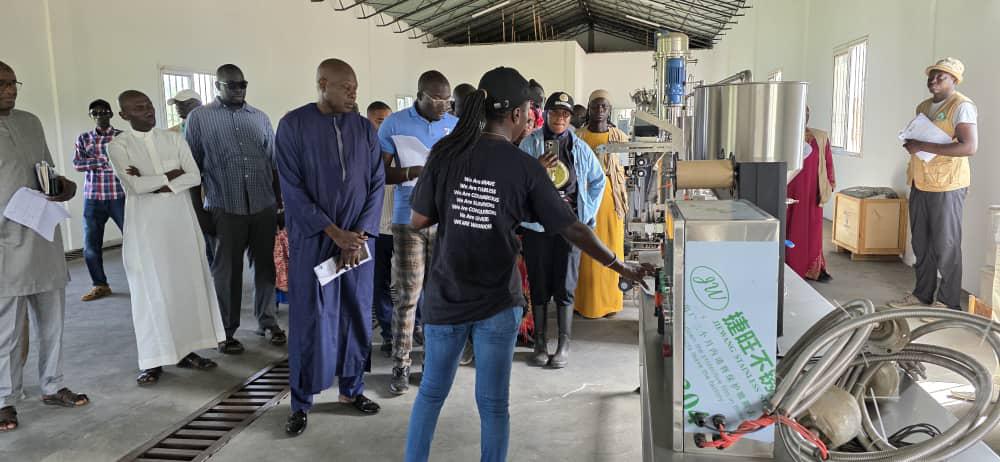Day 5 of the National Steering Committee (NSC) field mission began with a courtesy visit to the Hon. Governor of LRR, Mr. Seedy Lamin Bah. The mission, led by DPS Fatou Jammeh-Touray, introduced the team and outlined the objectives of the visit.
PD Mamour Jagne expressed appreciation to the Governor for his continued support to the ROOTS regional team and his active participation in project activities. In his remarks, Governor Bah commended ROOTS for its transformative interventions — from cold storage facilities and tricycles for youth to rice input support, vegetable gardens, and post-harvest processing facilities.
“ROOTS is changing lives in my region. My office will continue to work closely with the project to achieve national food self-sufficiency,” — Governor Seedy Lamin Bah.
The team proceeded to Tressor Women Warriors (TWW) Tomato Processing Facility in Kwinella — the first of its kind in the region.
President Aji Kumba Daffeh thanked ROOTS for the support through the Crisis Response Initiative (CRI), which aims to reduce tomato post-harvest losses. The machine, with a 200kg per hour capacity, will initially process tomatoes produced by local farmers.
She revealed that TWW has signed an MOU with the North Bank Farmers Association, which has over 6,000 members, to supply tomatoes to the facility — ensuring sustainability and broader impact. Their only major challenge remains security of the premises (fencing).
Next, the team visited Jouli community, beneficiaries of agroforestry support, jambarr cooking stoves, live fencing using lime seedlings, and firefighting equipment.
President Binta Camara and members shared how the support is protecting their forest and improving livelihoods. Beneficiary Jainaba Manneh noted that the jambarr stove is fast, uses less firewood, and produces no smoke — making cooking easier and safer.
“The jambarr is preventing us from smoke while protecting our forest,” — Isatou Jallow, Jouli Community Member.
DPS Fatou Jammeh-Touray encouraged communities to continue protecting the forest and avoid cutting down trees.
The final stop was at Burong Cluster Rice Fields, where women shared remarkable progress under the ROOTS Subsidized Input Support Program.
President Mariama Marr explained that before ROOTS, women harvested only 5–10 bags of rice, but now they produce 20–30 bags thanks to improved inputs, ploughing services, and land development.
“ROOTS has removed drudgery from our farming and given us hope,” — Mariama Marr, Burong Cluster President.
Ebrima Solo Camara added that most households are still eating from last year’s harvest, showing the sustainability of ROOTS’ support. The community expressed optimism that the ongoing land development will further increase production and called for additional equipment such as tractors.
The day concluded at the Burong Cluster Rice Fields, with the team impressed by the visible impact of ROOTS interventions in transforming rural livelihoods.


